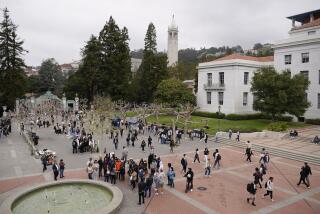Berkeley law school removes Boalt’s name from building, citing his anti-Chinese legacy
UC Berkeley removed the name “Boalt Hall” from a building of its prestigious law school Thursday, officially acknowledging that the virulent anti-Chinese views expressed by attorney John Henry Boalt will no longer be honored at the university.
After years of deliberation, the hall will now simply be known as the Law Building, UC Berkeley Chancellor Carol Christ wrote in a letter sent to the campus community Thursday.
“This is the first time a UC Berkeley building has had its name removed because the values of its namesake were so out of sync with those of our institution,” Christ wrote. “There is no question that building names are powerful symbols for those who walk across our campus. I believe that removing the Boalt name from our law building — while still acknowledging our ties to the Boalt family — will help us recognize a troubled part of Berkeley’s history while better supporting the diverse membership of our academic community.”
The law school’s buildings have carried Boalt’s name in one way or another since 1911, first in the “Boalt Memorial Hall of Law” and then with Boalt Hall when the law school moved into a new facility in 1951. Though “Boalt” was never officially part of the law school’s name, many in the California legal community referred to the Berkeley School of Law simply as Boalt Hall, and alumni called themselves “Boalties.”
But in 2017, law professor Charles Reichmann wrote a Berkeley law review article and a San Francisco Chronicle op-ed that exposed Boalt, a 19th century San Francisco attorney, as virulently anti-Chinese. The revelations rocked the school and plunged it into the national debate over what to do when honored historical figures turn out to have unsavory pasts. The controversy came as other schools, such as Stanford, the University of San Francisco and Cal State Long Beach, were reexamining California’s past and changing building names or dropping mascots associated with those who kept slaves or mistreated Native Americans and Asian Americans.
Boalt was instrumental in pushing the Chinese Exclusion Act of 1882 — the nation’s first immigration ban on a specific group of people. In one influential treatise, he wrote that the Chinese were unassimilable liars, murderers and misogynists who provoked “unconquerable repulsion.” Public sentiment against Chinese immigrants had grown in the 19th century as more than 300,000 came to California as laborers.
The op-ed prompted a strong response from Berkeley faculty, students and alumni, and a committee led by law school dean Erwin Chemerinsky recommended the name be removed in 2018. The university’s building name review committee agreed, and UC President Janet Napolitano approved the decision this month.
Tar Rakhra and Ryan Sun, Berkeley law students who advocated for the name to be removed, were at the law school entrance at 7 a.m. Thursday to watch the letters come down. The whole thing took one man about five minutes, said Sun, a third-year law student.
The discovery of Boalt’s racist views was jarring to Sun, who is Chinese American and chose Berkeley in part because of the area’s Asian American community.
“I was ... trying to achieve whatever dreams or passions that I had, and it felt like I was not meant to be here,” Sun said. “You’re attending class in a building named after someone who doesn’t want you to be there in the building, let alone in the country.”
Sun has become a leader at the law school — he’s surrounded by friends who are Asian American and Pacific Islander, and is the editor in chief of Berkeley’s Asian American Law Journal. But walking into the building Thursday morning was a particularly gratifying experience — “a sense of closure,” he said.
Times staff writer Teresa Watanabe contributed to this report.
More to Read
Start your day right
Sign up for Essential California for news, features and recommendations from the L.A. Times and beyond in your inbox six days a week.
You may occasionally receive promotional content from the Los Angeles Times.







